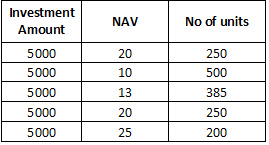Dont wan't to watch the video, read the text instead.
Ramnath 24 year old design engineer works with an automaker andlives with his family in Chennai. He is a well-read man, loves music and is inspired by his father & grandfather. Both, his grandfather and father,have worked and have saved all their life. Their savings were predominantly invested in fixed deposits (FDs), recurring deposits (RDs) and traditional insurance plans. Ramnath, has picked up the investment habit from his family and continues to invest in recurring deposits. He meets his colleague Naveen who is investing in SIP since last 1 year and his question to Naveen is why not RD, why SIPs?
Systematic Investment Plan (SIP):
"Little drops of water make the mighty ocean" Systematic Investment Plan (SIP) is nothing but small amount of money invested on a pre-set date every month into specific mutual fund/funds. One of the best ways of entering equitymarket is through Systematic Investment Plans (SIPs) in equity mutual funds, as it brings in an investment discipline for the investor. SIPs help to achieve financial goals by investing small sums of money on a monthly basis that eventually leads to accumulating the required corpus for reaching the goal.
For some investors who are afraid of long term commitments like PPF or Insurance plan, SIPs are the answer. They are flexible;
- SIPs are done in open ended funds where the investors can invest and take out the money any time
- There is no fixed tenor for running SIP. Once the SIP tenor is fixed, it can stopped in between or could be continued even after the tenor by placing the request with respective mutual fund company
- Full and partial withdrawal is possible during or after the SIP tenor
- The SIP amount can be increased or decreased
Just because SIPs are flexible doesn’t mean that the investment horizon could be shorter. Ideally, to reap the benefits of SIPs, the investment horizon should be for longer term. Longer the investment horizon, better the wealth accumulation.
What is rupee cost averaging?
Every common man understands while buying a commodity, buy when the price comes down and sell when price goes up. But when the decision comes to investing in equity we do exactly the opposite.
"What we have learned from history is that, we don’t learn from history" ~unknown
A SIP investor, while investing every month would end up buying more units when markets go down and buying less units when market goes up.
Illustration of Rupee cost averaging:

At every market correction an investor would end up buying more number of units. When the unit price goes up, he tends to gain.
What are the benefits of Systematic Investment Plan?
Power of Compounding
Estimated returns from SIP into an Equity Mutual Fund (at an assumed rate of 12% p.a.)

Estimated returns from Recurring Deposit (at an assumed rate of 8% p.a.)

When we look at the corpus accumulated at the end of the tenor, the wealth accumulation is at its best in the long run. As the time given to investment increases, the wealth builds at an accelerated pace because of compounding effect.
As per the illustration given above, the difference between the RD and the Equity Mutual fund SIP, could be more than double in the long run.
Illustration: Systematic Investment Plan (SIP) Performance of a diversified equity fund at different 5 year investment cycles

Illustration Disclaimer:
The above example is only for illustration purposes, purely to explain the concept of the indexation. For more details please consult your Tax Advisor.



